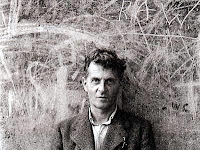Today in Language: Ludwig Wittgenstein
Ludwig Wittgenstein died on April 29, 1951. He was a linguist's philosopher. In Tractatus Logico-Philosophicus he tackled the limits of language and thought--on what can or cannot be expressed. This had a lot of ramifications for philosophy but also for linguistics, though it is important to note that Wittgenstein overhauled his theory of language later in his career (in spite of his initial confidence in the accuracy and definitiveness of Tractatus).

Nonetheless, Tractatus is an important work, and I for one actually enjoy the rigid structure of numbering every proposition and sub-proposition. It enables the reader to follow Wittgenstein's thought process a bit more, though I still don't understand everything.
The seven key propositions allow one to follow the book's argument, though I leave out proposition 6 here simply because it is not self-explanatory:
1. The world is all that is the case.
2. What is the case--a fact--is the existence of states of affairs.
3. A logical picture of facts is a thought.
4. A thought is a proposition with a sense.
5. A proposition is a truth-function of elementary propositions. (An elementary proposition is a truth-function of itself.)
7. What we cannot speak about we must pass over in silence.
NOTE: This is based on the translation by Pears & McGuinness.

Nonetheless, Tractatus is an important work, and I for one actually enjoy the rigid structure of numbering every proposition and sub-proposition. It enables the reader to follow Wittgenstein's thought process a bit more, though I still don't understand everything.
The seven key propositions allow one to follow the book's argument, though I leave out proposition 6 here simply because it is not self-explanatory:
1. The world is all that is the case.
2. What is the case--a fact--is the existence of states of affairs.
3. A logical picture of facts is a thought.
4. A thought is a proposition with a sense.
5. A proposition is a truth-function of elementary propositions. (An elementary proposition is a truth-function of itself.)
7. What we cannot speak about we must pass over in silence.
NOTE: This is based on the translation by Pears & McGuinness.

Comments
Post a Comment